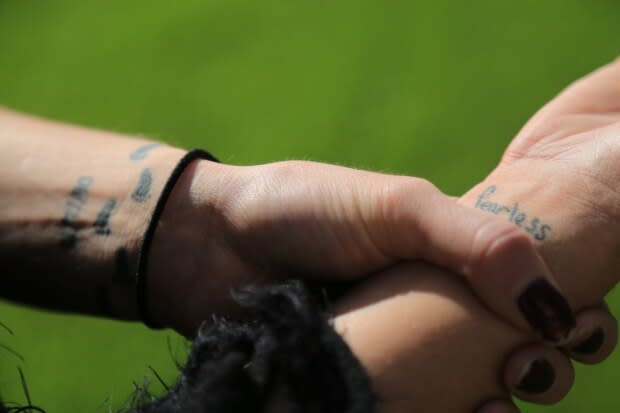Sask. woman says sharing is key to overcoming addiction
The word "fearless" is tattooed on Angela Singer's right wrist, but that doesn't mean her journey to recovery has been an easy one.
In fact, she credits the death of a beloved aunt with helping to guide her to the help she needed. She has another tattoo, on her left arm, which her aunt had as well: "Without struggles, there is no progress."
The 25-year-old will be sharing her story at a special luncheon during the Recovery Capital Conference in Regina on Friday.
Singer grew up outside Regina and began drinking at 13 and doing drugs a few years later. "I just thought that's what high school is, right?"
I knew that no amount of drugs and alcohol was going to fill that void. - Angela Singer
By the time she was 21, Singer says her life was in chaos.
"That's when it became absolutely out of control," she said. "I started drinking and using daily."
Singer says she lost friendships, spent a night in the drunk tank and began showing up late for work.
Then a friend overdosed and two weeks after that her aunt died.
"I think at that point I just had so much pain, like on top of everything else," Singer said. "I just, I knew that no amount of drugs and alcohol was going to fill that void."
Singer's aunt had been a member of the support program Alcoholics Anonymous and had invited her niece to a meeting before she died.

Singer thanked her aunt, took some pamphlets and shoved them in her dresser drawer. She kept on with what she had been doing.
After her aunt died, Singer felt guilty about not taking her up on the offer and drove to a meeting of her aunt's support group.
It was just the most genuine type of love that I'd felt. -Angela Singer
"I thought I'd go once and just say my goodbyes and have my closure and I'd never go back," Singer said with a laugh. "But it didn't work like that. People — all of her friends — and people I didn't even know just came up to me and they were sharing their stories and, you know, it was just the most genuine type of love that I'd felt."
Singer wants others to know that the same is possible for them. "I know when you're in that place, you never think that it is — but it is," Singer said.
She encourages people to be open with others.
"I had a lot of shame," Singer said. "I was a ticking time bomb of all these secrets and things that I never talked about and all the pain that I'd never shared with anybody.
"I think a lot of times you think that you're the only one," Singer said. "A lot of times with addiction it's a very isolating place to be. So to have that complete opposite feeling goes a long way."



